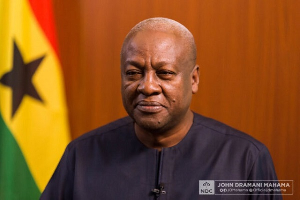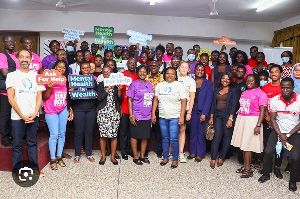Ghana's Minister of Foreign Affairs and Regional Integration, Ms Shirley Ayorkor Botchwey, has held talks with Nigeria's Foreign Affairs Minister, Mr Geoffrey Jideofor Kwusike Onyeama in Abuja over the decision by Africa’s most populous nation to close some of its borders – a decision that is adversely affecting Ghanaian traders.
Together with Ghana's Trade and Industry Minister Alan Kyerematen, Ms Botchwey also held discussions with the Minister of Industry, Trade & Investment of Nigeria, Mr Otunba Niyi Adebayo.
The Abuja meetings, which took place on Wednesday, 16 October 2019, were aimed at resolving the border closure debacle.
Nigeria partially closed its borders with Benin in August this year to curb the spate of rice smuggling which the oil-rich country said is threatening its attempt to boost local production.
The move is ostensibly aimed at stopping the movement of illicit weapons and other smuggled goods through the various entry points.
The closure, however, has affected the movement of goods and services from the West African sub-region into Nigeria through that section of the country’s border.
Ms Botchwey's trip to Abuja on Wednesday was pursuant to ongoing efforts by the government of Ghana to ensure that goods pass safely into Nigeria and the ECOWAS sub-region.
During the separate meetings, Ms Botchwey acknowledged the long-standing cordial relations and cooperation between Ghana and Nigeria and also recognised the value of the combined strength of the two countries in working toward the prosperity of their citizenry.
Ghana’s Trade Minister re-echoed the sentiments expressed by Ms Botchwey which necessitated their trip.
For their part, the two Nigerian ministers, Mr Onyeama and Mr Adebayo reiterated that the closure of the borders was not targeted at Ghana.
According to them, the closure was aimed at fighting the nefarious activities of smugglers which were undermining the security and agricultural policies of the Federal Republic of Nigeria.
The two ministers expressed regret about the collateral damage caused by the closure of the borders to Ghanaian businesses, traders and the government of Ghana.
However, they noted that Nigerian businesses have also suffered severely from the border closure, which, for them, was necessary to preserve the security and economy of the country.
They, however, assured the Ghanaian delegation of the Federal government's readiness to work with Ghana to provide unhindered access to each other’s markets.
To this end, both sides agreed that they work on a safer corridor for Ghanaian goods in transit from Benin and vice versa, to avoid the collateral consequence.
Ghana is expected to provide further information to Nigeria on Ghanaian companies that do business in Nigeria, the goods and companies affected by the border closure and those likely to be affected as well as stranded trucks at the borders to enable officials of Nigeria to identify and give preferential treatment to the Ghanaian traders.
Meanwhile, the Heads of Customs of both countries are expected to operationalise the decisions taken at the meeting by jointly working out modalities for the creation of a safe corridor.
They are also expected to address other outstanding issues relating to trade between Ghana and Nigeria.
Business News of Thursday, 17 October 2019
Source: classfmonline.com

















